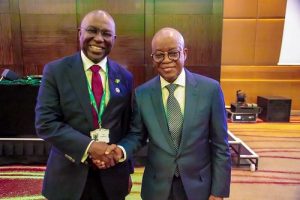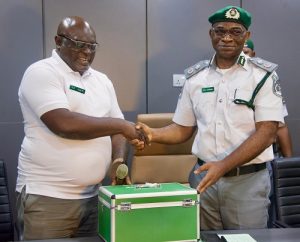FG Frowns at Surcharges Imposed on Shippers by Foreign Shipowners, Agents
*Vows to take appropriate measures against unfair trade practices
*NSC saves N2bn through confirmation of reasonableness of demurrage
By Francis Ugwoke
The Federal Government Monday frowned at surcharges imposed on goods meant for Nigeria and other West and Central African sub-region by multinational shipping companies and their agents.
Vice President Yemi Osinbajo said the federal government was disturbed by the negative effect of such surcharges on the national economy.
Osinbajo spoke on the occasion of the one-day sub-regional summit on unfair shipping surcharges and high local shipping charges organised by the Nigerian Shippers Council in collaboration with the Union of African Shippers Council Councils and Global Shippers Forum in Sheraton Hotels, Abuja.
Osinbajo who was represented on the occasion by the Minister of Transportation, Hon. Rotimi Amaechi said what is more worrisome is that affected countries were usually not consulted by the shipping companies when such surcharges are being imposed.
He said that the process of introduction of the surcharges lack transparency as they are not based on verifiable and available statistics.
Osinbajo described the unilateral and arbitrary imposition of such surcharges on cargos bound for the sub-region as a contradiction of the norms and ethics of maritime transport.
He also said the surcharges amount to huge sums of illegal capital flight from the countries of the sub-region depleting their limited foreign exchange/reserves.
“For instance, data obtained from Nigerian Shippers Council’s confirmation of reasonableness of demurrage charges for Central Bank of Nigeria revealed that more than N2billion is repatriated by multi-national shipping companies in a quarter of a year”, he said.
The offending surcharges were identified as Bunker Adjustment Factor, Currency Adjustment Factor, War Risk Surcharge, Congestion Surcharge, Peak Season Surcharge, Extra Risk Insurance Surcharge, Freight Rates Surcharge, Port Operation Recovery Surcharge, among others.
The Vice President said the West and Central African states were currently facing harsh socio-economic conditions that have impacted negatively on trade.
Osinbajo called on participants at the Forum drawn from various countries of the region to come together and adopt common political, diplomatic and operational strategies that will positively impact on the economy of the sub-region.
According to him, this could be done through the constitution of a standing group of experts to represent the sub-region and engage ship owners on surcharges and related issues.
“In other words, the group is expected to audit and interrogate the cost elements in trade and transport with a view to eliminate its inflationary effect on the regional economy and make our export products competitive in the international market”.
On the part of the federal government, Osinbajo said Nigeria will not hesitate to take appropriate measures including legislation to check these unfair trade practices.
He said this was why the federal government mandated the NSC to carry out a comprehensive audit of all the seaport terminals in Nigeria to ascertain their efficiency and competitiveness.
According to him, “Government will ensure that the outcome of the audit report will be fully implemented for improved port operation. The report of the audit will also spell out the responsibilities of terminals and federal government. Similarly, the Council in her capacity as the Port Economic Regulator is further mandated to monitor and supervise compliance to the Standard Operating Procedures by all port agencies and port service providers for improved service delivery”.
Osinbajo added that the federal government through the NSC has put in place a machinery to address some of the challenges posed by high cost of doing business.
“For instance, in 2018, NSC harmonized the tariff nomenclature for local shipping charges in Nigeria; established a sustainable framework for future review of tariffs and established standards of service for all container terminals in Nigeria”.
“Also to reduce transport cost and improve efficiency in line with the Economic Recovery and Growth Plan, the government of Nigeria is promoting the establishment of modern transport infrastructure such as Inland Dry Ports, standard rail gauge, truck Transit Parks and the deep seaport in Lekki that supports multimodal approach to cargo delivery”.
In his welcome address, the Executive Secretary of the NSC, Mr Hassan Bello said some of the surcharges have been prevalent in the sub-region under various nomenclature such as the Peak Season Surcharges and War risk surcharges to mention a few.
Bello added that while some of the surcharges are supposed to be temporary measures by shipping lines involved in shipment of goods worldwide to address peculiar challenges of shipping at destination and subject to removal when the situation normalizes, regrettably some of the charges have assumed a permanence without justification or basis for negotiation.
He disclosed that the NSC has for the past one year actively engaged the shipping lines in Nigeria in a comprehensive negotiation on local shipping charges.
He said that the negotiations have been to establish a sustainable mechanism for further tariff negotiation; to collapse the myriad of charges to a manageable standard nomenclature – the charges have been collapsed from 18 to five; ensure that all charges must be justified and tied to measurable services and to ensure that no review of charges will be made without negotiation with NSC.
According to him, the aim of the Council was to reduce the local shipping charges by 35 percent.
Bello added that in order to reduce capital flight, the CBN sought for the assistance of NSC as Port Economic Regulator to confirm reasonableness of freight rate and determine reasonableness of demurrage.
Commending the CBN for the collaboration, he said the NSC is also a member of Nigerian Export Supervision Scheme (NESS) and Comprehensive Import Supervision Scheme (CISS), adding that its active participation in the two committees has led in reduction of cost and ensured efficiency at the ports.
“Reduction of cost is the responsibility of all stakeholders including the government especially in ensuring the provision of modern, efficient, integrated and connected transport infrastructure”
He added that it was also important that the government encourages transparent processes and procedures and generally ensures that an efficient competitive and friendly environment is created. This would surely result in cost reduction.
“It is important to state that in the long run, arbitrary and unilateral increase in charges would not benefit operations, or general procedures in our countries. A chaotic, unbridled situation of sporadic, sometimes astronomical pricing regime is adverse to the development of shipping. It is a lose-lose situation. Transport should be scientifically, fairly and appropriately priced with the aim of providing balance and equilibrium. A fair and level playing field for all parties”, he said.
Participants attending the Forum were drawn from West and Central African countries.
The Secretary General of the Global Shippers Forum (GSF), Mr James Hookham who came for the programme called on the sub-region to rise against the surcharges through legislations.
For instance, he said Sri Lanka which introduced an all inclusive freight law that has checked such arbitrary surcharges by carriers.
He read the Sri LKank regulation as follows: “No licensed service provider shall charge from an exporter in Sri Lanka any charge other than an all inclusive freight rate… where the carrier is contractually liable to pay… for the carriage of goods from origin to destination as specified in the Bill of Lading or forwarder’s cargo receipt”.





